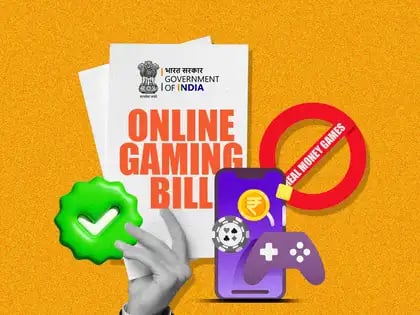AdVocate harshit Sachar | chamber no: 617 | district courts ludhiana | 2817 gurdev nagar ludhiana | ✆+91 7889228369
Online Gaming Ban Under the New Central Law (2025)
India bans real-money online gaming under the Promotion and Regulation of Online Gaming Act, 2025, reshaping the gaming and fantasy sports industry.
AWARENESS & COURT PROCESSES
Team Sachar Law Firm, Ludhiana
8/24/20251 min read


The Promotion and Regulation of Online Gaming Act, 2025, recently passed by Parliament, has introduced a sweeping ban on real-money online gaming across India. The law permits only skill-based games without real-money involvement, bringing a massive change for the gaming industry, app developers, and players.
Key Provisions of the Act:
Ban on real-money gaming: Fantasy sports, betting, and games involving wagering or stakes are now illegal.
Allowed games: Only skill-based games (like chess, quizzes, or logic-based games) are exempt from the ban.
Penalties: Operating, promoting, or participating in banned games can attract heavy fines and imprisonment.
Regulatory authority: A central authority will oversee compliance and approve permissible games.
Impact on Businesses and Individuals:
Gaming platforms such as Dream11, MPL, and other fantasy sports operators face major legal hurdles.
Advertisers and promoters need to ensure they are not indirectly promoting banned games.
Players engaging in real-money games could face legal action and financial loss.
Why This Law Matters:
This reform aims to curb gambling-related addictions, protect consumers from financial exploitation, and regulate the rapidly growing online gaming industry. While it has been welcomed by some for promoting responsible gaming, others argue it restricts innovation and employment in the gaming sector.
Legal Advice:
If you are a business owner or individual associated with online gaming, it is crucial to:
Review your compliance with the new Act.
Stop any activity involving real-money gaming.
Seek legal consultation to avoid penalties.
This law marks a significant turning point for India’s gaming industry and is likely to spark debate on balancing regulation with innovation.
Services
Sachar Law Firm – Advocate, Lawyer, Attorney & Solicitor Services in India | Ludhiana, Punjab.
Expert legal advice across various practice areas - Civil, Criminal, Divorce and Matrimonial, Consumer and Corporate laws, Bail Matters, Property Contract Disputes, Insurance claim disputes, cyber Crime cases, Cheque bounce, Family Divisions, Arbitration. Bail Matters, Electricity Board Cases, Appeals before Session court Ludhiana, Marriage certificate, Court Marriage, Succession Certificate Accident Claim (MACT), NRI Legal Matters, NRI Property Matters.
“Get in Touch with Sachar Law Firm”
Quick Links
© 2025. All rights reserved.
Advocate Harshit SACHAR
Legal Blog
2817, 1st Floor , Gurdev Nagar, Ludhiana, Punjab -141001
Address: Office Cum Res:
Corporate Liquidation and Recovery Litigation
☎️ 0161 7965410
